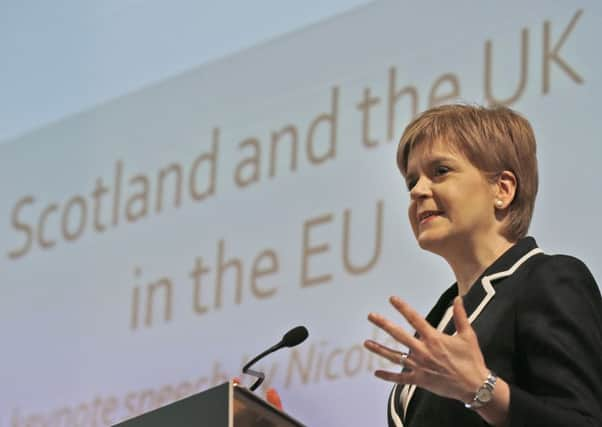Leaders: First Minister needs to stick to EU hard facts


Just as voters are beginning to get fired up by the debate on whether the UK should leave the European Union – as witnessed by the recent spat between Brexit supporter Boris Johnson and Prime Minister David Cameron, with various “unholy alliances” between politicians springing up – First Minister Nicola Sturgeon has somewhat muddied the waters.
After basing her political career working towards Scottish independence, Ms Sturgeon says she does not want Scotland to achieve independence as a result of the UK withdrawing from the EU.
Advertisement
Hide AdAdvertisement
Hide AdThis will confuse some, as just the week before last Ms Sturgeon said that a Brexit vote on 23 June would prompt a second Scottish independence referendum. She gave no impression that this kind of development would trouble her.
Her remark also highlighted doubts over Scotland’s position within the UK once more, especially to those who may have thought the threat of independence had waned following the outcome of the Scottish independence referendum.
Yesterday she repeated her belief that the ‘wrong’ EU vote could trigger a second Scottish referendum – but then said a Brexit followed by Scotland becoming independent would not be her preference. “I do want Scotland to be independent but I don’t want Scotland to become independent because the UK chooses to leave the European Union.” So, just what does she want? People will be confused.
However, her senitment can be understood. Rather than independence being achieved after voters choose a Brexit, the First Minister wants it delivered after a positive case has been made, to ensure its long-term success.
Instead of Scotland deciding to embrace independence, it would have opted for this option as a means of reacting to the EU exit. Scotland could be bounced into independence, which would not be the best reason for taking such a fundamental step.
So, in fact, Ms Sturgeon is portraying herself as playing the long game and not giving encouragement to those who want a second independence referendum at the earliest opportunity. This approach makes sense, because she will be aware that even a Brexit would not necessarily result in a ‘Yes’ vote at a second Scottish referendum so soon after the first one was lost.
If the First Minsiter wants to figure heavily in the debate over Britain’s future relationship with the EU ahead of the referendum, she might benefit from leaving Scottish independence out of it, and instead focus on what a Brexit – or decision to stay – would mean for the Scottish economy, for security, for migration.
Friends are turning to one another asking if we really will lose trade links if we go or if we can protect our human rights by ourselves.
Advertisement
Hide AdAdvertisement
Hide AdThat’s what we really need to hear about. The possibility of a second Scottish referendum can only be speculation at this stage, and serves only as a distraction from the immediate issues at stake.
Salt intake leaves a bitter taste
The more observant of us may have noticed a true chef flinch when the first act of a dinner guest is to douse a lovingly cooked meal with lashings of salt before even tasting a mouthful.
Yet we are constantly being told by health campaigners that too much salt in our diet - and sugar too - damage our health.
But still we persist, coming home from the supermarket with boxes of salt from exotic locations such as the salt marshes of the Camargue in the south of France to the shores of the Outer Hebrides. The contents are then often used liberally with little or no self-control - when the chances are that our foods contain too much sodium chloride in the first place.
The food industry itself stands accused of failing to self regulate. Some have reduced salt content, but not everyone feels obliged or compelled to follow suit. The result is that the problem persists.
If we cannot self-regulate, there is a strong argument for regulating the amount of salt that can be contained in food. It would be unfortunate if that happened, but understandable if we are making no progress.
This is especially the case when we find out that everyday foods we buy in good faith are harbouring very high levels of salt, added by manufacturers.
But any reduction during food production can easily be countered by our own lack of self discipline.
Advertisement
Hide AdAdvertisement
Hide AdWe can limit salt content, but education is critical, and the desired reduction in intake will not be a culture change that happens overnight. In the meantime food manufacturers have to play their part to help us get there, or find the matter is taken out of their hands.